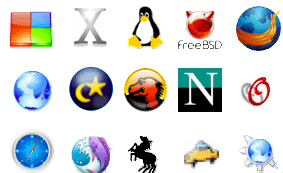Browsers ! – We’re all more than likely used to unpacking a PC and using Microsoft’s Internet Explorer (IE). Computers that come with the Window’s operating systems as standard come with IE, so it’s the browser of choice among the millions who accept the out of the box Microsoft experience with their PCs.
Although this doesn’t mean that things aren’t changing. Firefox, Chrome, Safari and Flock are all becoming increasingly popular. Changing browsers are easier than ever and as there are more choices of browsers out there. People are much more willing to make the leap.
Google’s Chrome is now second and rising in the browsers wars, having replaced Mozilla’s Firefox before Christmas. In figure terms, IE now holds 37 per cent, Google Chrome 27 per cent and Mozilla 25 per cent, with the rest accounted for by the vast array of other browsers. So, what’s the difference between them?
Page Contents
Great 2012 Comparison Of All The Latest Versions Of Browsers
Internet Explorer
The daddy of Internet browsing, IE is a very solid experience, though there have been reports of security issues and it does have a reputation for taking up memory and being bloated. There is also a tendency for Internet Explorer to crash during Flash videos.
Essentially its popularity is down to the fact it is preloaded on PCs as standard and people aren’t bothered changing to an alternative, for whatever reason. Check out Internet Explorer Shortcuts.
Google Chrome
Chrome is the main Microsoft contender, though it was only released over three and a half years ago. Chrome takes the well renowned minimalist Google approach to browsing. It’s also a very fast experience, which offers a clear advantage to surfing the internet.
Google also comes with a number of very useful Google apps, added in a similar manner to that of a smart phone. It comes with Flash inside the browsers, meaning the video player doesn’t have to be downloaded and should it freeze, it only does so inside one tab.
This means the whole browsers doesn’t have to be closed, which is conducive to a great browser experience. Other great additions are the ability to search from the address bar and also the fact it opens up with previously viewed thumbnails on show. These are all little additions that make the Chrome experience all the more enjoyable and user-friendly. Check out Google Chrome Extension For Web Developers.
Mozilla Firefox
Firefox is the tech-lover’s browsers and this can be seen in its less than attractive aesthetics. Now third in terms of popularity, Firefox is a great browser and has really got a lot faster in recent incarnations.
It’s well renowned for its stability and also its security. Firefox supports a wide range of additional plug-ins and pieces of software and it’s only downside is that it is a one process browser. This means that if it undergoes a problem the whole experience is shut down and restarted.
Safari
How could we forget the Apple Safari browsers ? Safari, was once only available on Apple Macs, however is now available on the PC equivalent. Safari’s strength is in its intuitive interface. Like all things Apple, Safari offers the most usable interface on the market.
However, it’s not as fast as Chrome, which many users will find off putting and not nearly as secure as Mozilla Firefox. It is a traditional tab experience and there are plenty of additional plug-ins, ensuring it’s still a great experience. Check out Safari Best Extensions To Master Your Mac
Choose Your Browser or Browsers From The Above
Most people find that the browsing experience is a personal one that means choosing your requirements, whether they be plug-ins, speed, or security. Consider your needs and then choose your browser or browsers from the above, or even from some of the other alternatives.
 Tricks Window Technology Zone – Complete Technology Package for Technology News, Web Tricks, Blogging Tricks, SEO, Hacks, Network, Mobile Tricks, Android, Smartphones etc.
Tricks Window Technology Zone – Complete Technology Package for Technology News, Web Tricks, Blogging Tricks, SEO, Hacks, Network, Mobile Tricks, Android, Smartphones etc.








